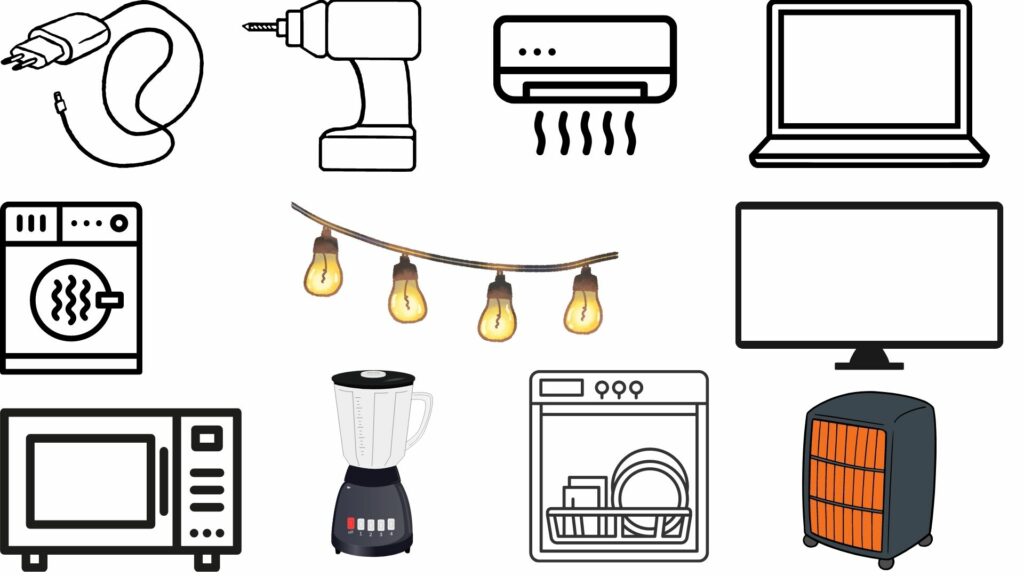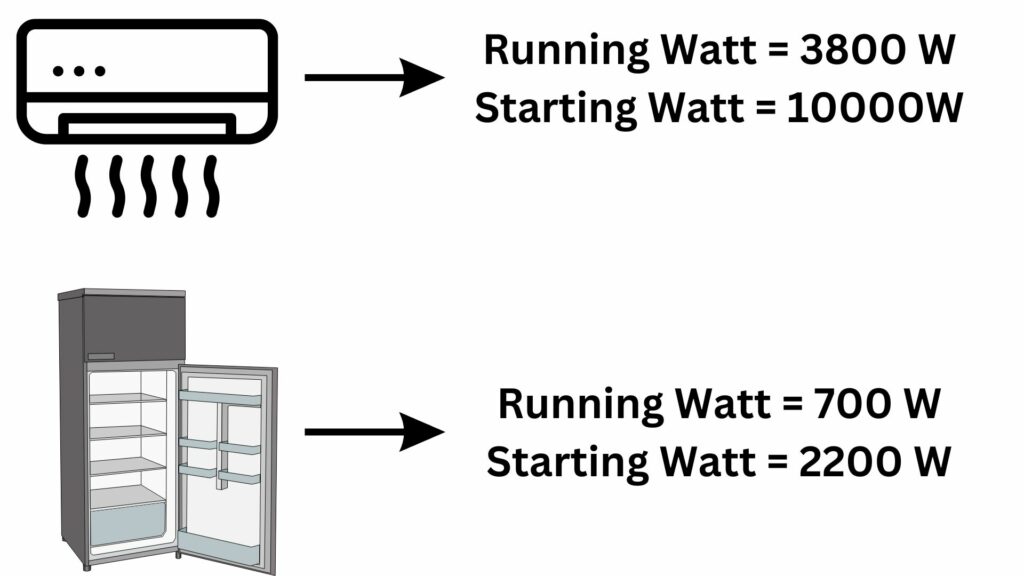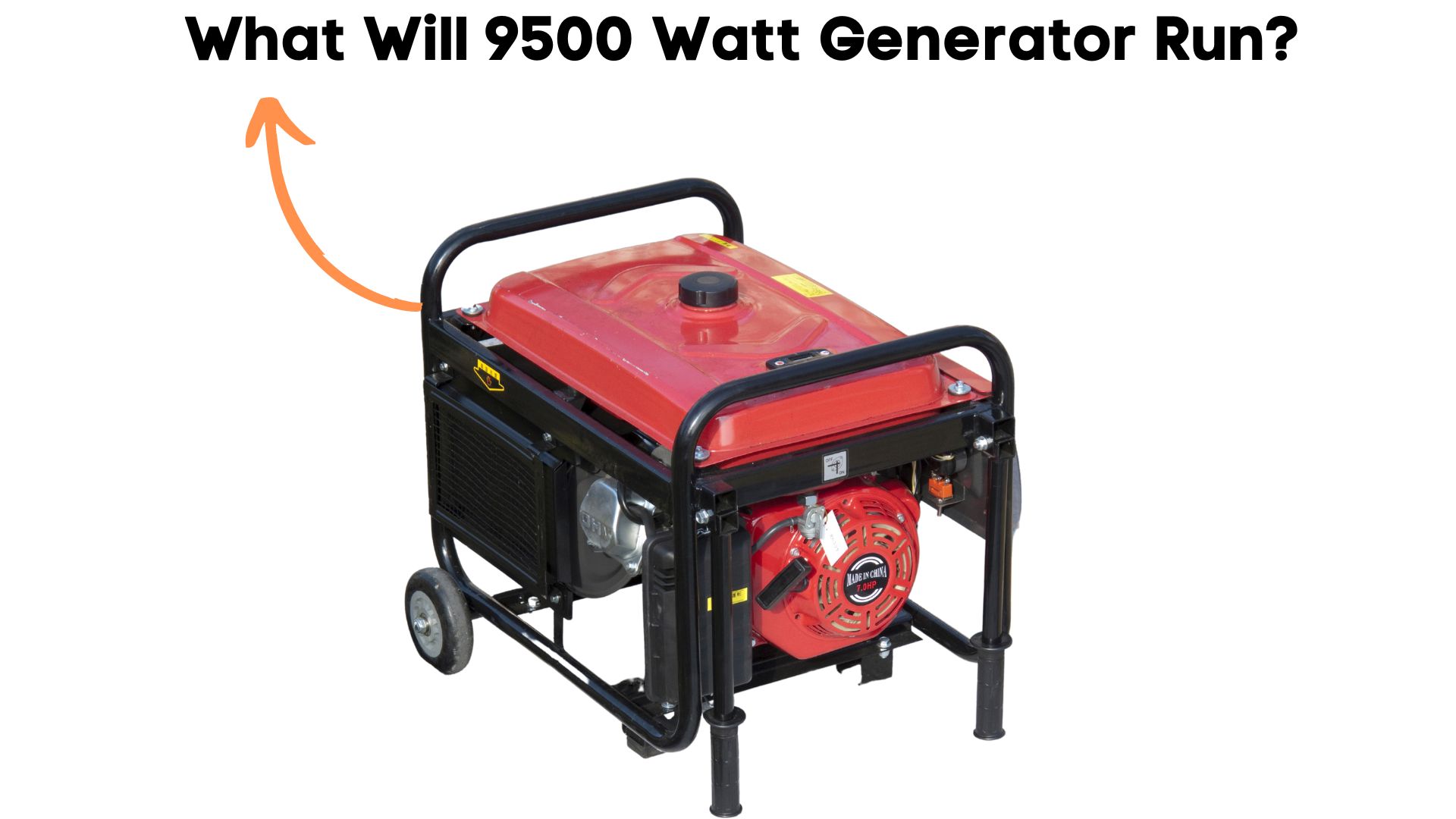A 9500W inverter generator is capable of running an entire house (including a 3-ton air conditioner).
According to Time Magazine, weather catastrophes are wreaking havoc on the power grid in the U.S. The Guardian raised a similar concern in 2022. It noticed that power outages resulting from bad weather had doubled in the last two decades.
Interestingly, the U.S. Energy Information Administration revealed in a 2021 report that most power interruptions in the U.S. lasted roughly seven hours. That doesn’t sound so bad. But keep in mind that food in a refrigerator will only remain safe for 4 hours during a power outage. That estimate is only accurate if you keep the doors closed. The duration reduces drastically if you repeatedly open the door.
Therefore, it is in your best interests to get a generator capable of running your appliances during a blackout. Does a 9500W qualify?
Things To Consider While Determining What Will 9500 Watt Generator Run
1). The Running Watt
Consider the table below. It reveals the average running watts of common household items.
| Appliance | Running Wattage |
| Phone Charger | 25W |
| Outdoor Lights | 40W |
| Laptop | 60W |
| Cordless Drill | 100W |
| Clothes Dryer | 5400W |
| Central AC | 3800W |
| LCD TV | 150W |
| Blender | 500W |
| Microwave | 1200W |
| Water Heater | 3000W |
| Oven | 2000 – 5000W |
| Hair Dryer | 1250W |
| Electric Grill | 1250W |
| Dishwasher | 1500W |
| Space Heater | 1800W |
| Coffee Maker | 1000W |
| Refrigerator | 700W |

As you can see, the clothes dryer uses more energy than any other device on the list. However, at 5400W, the dryer still uses fewer watts than a 9500W generator produces.
Therefore, you can trust a 9500W generator to run most household items individually. But can it run the entire house? That depends on how many things you expect to run simultaneously. If you add the watts of all the items in the table above, their total will exceed 9500 watts.
This may encourage you to assume that a 9500W generator is incapable of running your whole house, but that isn’t true. Why? Because most people don’t use all these appliances simultaneously.
Think about it. When was the last time you operated a well pump, oven range, air conditioner, and electric grill at the same time? Even when you have power from the grid, the only heavy-duty items you run routinely are the air conditioner and refrigerators. Every other item operates for a few minutes before shutting down.
Therefore, a 9500W generator can run your whole house even if you own all the items above and more. Most consumers are smart enough to limit the number of heavy-duty items they operate simultaneously during an outage. If you apply common sense, you won’t overload the generator.
2). The Starting Watt
The starting watts are the most important aspect of this equation. Why? Consider the table above. A central AC has an average running wattage of 3,800. But the starting wattage can easily exceed 10,000W.

A fridge uses 700W during normal operations but 2200W when it starts, possibly even more. But doesn’t that disqualify a 9500W generator from running the air conditioner? Not necessarily. Like the air conditioner, generators have starting and running watts.
Modern generators are designed to accommodate that initial spike some machines generate when they cycle on. The best option would be for a generator’s running watts to exceed the appliance’s starting watts. However, you can also use a generator whose starting watts exceed the appliance’s starting watts.
Naturally, using multiple heavy-duty devices with a high starting wattage will overwhelm the generator. Again, the key is to apply common sense. Turn some heavy-duty appliances off before turning others on.
3). The Brand
The brand matters because it influences the quality. A low-quality 9500W generator is more likely to overload. You can’t trust the unit to withstand the electrical demands of ovens, water heaters, dryers, toasters, and other heavy-duty appliances.
Limit your purchases to brands with a strong reputation. Scan the consumer feedback for strong reviews before buying a particular generator. This is particularly important for homeowners living in regions with long and frequent blackouts.
A low-quality generator can keep you afloat for a few hours if power outages are rare in your area. Frequent outages will wear a low-quality generator down because of all the use it gets.
How To Calculate How Many Appliances Will 9500 Watt Generator Run?
- Make a list. It should only include vital appliances you may require during a blackout. Keep in mind that generators are emergency tools. Don’t waste their power on luxury items.
- Find each item’s starting and running watts. You will find this information on the nameplate or manual. Starting watts matter to machines with motors. Therefore, don’t fret if you can’t see the starting watts for a phone charger.
- Use your list to find the total running and starting watts.
- Find a generator whose running and starting watts exceed the total running and starting watts for your appliances. What if your generator doesn’t mention a starting wattage? The generator’s running watts should exceed the total starting wattage.
If the total running and starting watts are less than 9500 watts, the 9500W generator will cater to your home’s needs during a blackout. If the total starting and running watts exceed 9500 watts, get a more substantial generator with a higher wattage.
If the 9500W unit is all you have, it can still work if you limit the number of appliances running simultaneously.
You should learn to perform these calculations yourself because they will lower your expenses. Most people can’t afford to buy the largest generators the market can offer. This is because the largest generators are also the most expensive.
Additionally, they have higher fuel costs because their tank sizes are bigger. Calculating your home’s total wattage allows you to identify smaller, cheaper generators that can still run every appliance that matters to you.
How Long Will A 9500 Watt Generator Run?
| Running Watt | Fuel | Tank Capacity | Load Percentage | 9500 W Generator Lasts For |
| 9500 W | Diesel | 5 Gallon | 100% | 4.24 Hour On A Full Tank |
| 9500 W | Gasoline | 5 Gallon | 100% | 3.71 Hour On A Full Tank |
| 9500 W | Liquid Propane | 5 Gallon | 100% | 2.82 Hour On A Full Tank |
- If you prefer to perform these calculations yourself, start by identifying the tank size. Gallons X 137,381 BTU will give you the available energy. This is based on the US Energy Information Administration’s assertion that one gallon of diesel fuel equates to 137,381 BTU.
- Because the generator can’t extract all the energy from the fuel, determine the unit’s efficiency and multiply it by the generator’s available energy.
- Turn the available energy (in BTU) into kWh. Since 1kWh = 3,412 BTU, divide the BTU you calculated above by 3,412.
- Once you have the kWh, you know the amount of energy a generator with that particular tank size will produce. Now it becomes a simple matter of multiplying the generator’s kW rating by the load. Divide the kWh you calculated above by the answer to get the hours the generator will run.
Those calculations seem complicated to many people, which is why they use online calculators. Additionally, Learn Metrics has tables showing consumers the running time for each generator, depending on the fuel type and wattage.
What Factors Affect A 9500 W Generator’s Running Time?
- Fuel
The fuel type is the most important consideration because it affects accessibility. For instance, gasoline is easy to find because of its popularity. But the shorter shelf life is unappealing. Diesel is more efficient. Propane is clean, but you must invest in a propane tank. But does the runtime change?
Yes, it does. For instance, gasoline generators remain in operation for eight or more hours on a full tank. That figure jumps to 24 – 48 hours for diesel and 48 hours for propane generators.
- Tank Size
The bigger the tank, the more fuel it can hold, and the longer the generator will run on a full tank.
- Load
What are you running? Are you operating one or two devices or all the appliances in your house simultaneously? The bigger the load, the more energy the generator will expend and the shorter the runtime.
- Generator Type
Standby generators are powerful. They can run entire buildings for several days if you keep topping up the tank. They are designed to operate for longer durations. Smaller portable generators are the opposite. Consumers use them for hours during emergencies, not days.

